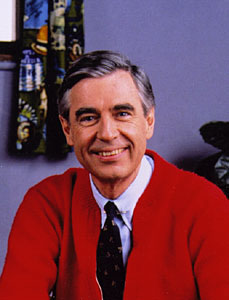
Bible connection
We destroy arguments and every lofty opinion raised against the knowledge of God, and take every thought captive to obey Christ. —2 Corinthians 10:5
All about Fred Rogers (1928-2003)
Fred Rogers, television pioneer and gentle subversive for Jesus, was born in 1928 in Latrobe, PA. He went to a local high school and studied piano at Dartmouth and at Rollins College in Florida, graduating in 1951. While taking a break from college to visit his parents, he saw their newest favorite gadget: the television. He had mixed feelings about the programming, but he was inspired to use the powerful medium for something wonderful.
Rogers married Sara Byrd in 1952; they had two sons. He got one of his first jobs working at a local Pittsburgh community television station, WQED. He became one of the pioneers in the field as part of a team who improvised the Children’s Corner—also serving as puppeteer. While developing meaningful content for kids, Rogers also finished his Masters of Divinity from Pittsburgh Theological Seminary. After he was ordained by the Presbyterian Church USA in 1963, the church charged him to create quality children’s programming.
He moved to Toronto in 1963 to play Mister Rogers in a show for the CBC (Canadian Broadcasting Corporation). Here he further developed several characters and songs that would become famous. That 15-minute program was called Misterogers. In 1966, he acquired the rights to various elements of the show and moved back to Pittsburgh to work with WQED. He began Mister Rogers’ Neighborhood, for which he wrote most of the scripts, the music, played several of the characters. In 1968, PBS (Public Broadcasting Service) began broadcasting Mister Rogers Neighborhood all across the country. Rogers hosted the program until 2000.
During its run of daily episodes, Rogers hardly embellished his offscreen personality (besides the puppets, of course) because he thought authenticity was a gift to kids. He did not endorse any products and only served as a spokesperson for a few non-profits dealing with education. He visited children in the Pittsburgh hospitals regularly and volunteered inside a state prison. When PBS’ funding was under fire by a Senate Committee in 1969, Rogers gave a key testimony that saved the network.
The show was very simple and did not include fast-paced action or over-stimulating animations, which Rogers called “bombardment.” Wearing the famous zip-up cardigans knitted by his mother, Mister Rogers talked directly to his audience imaginatively and engagingly. He “took them” on field trips to see how crayons were made and explored themes of being afraid, going to school, how good it feels to be able to control your temper, teaching kids that they have worth and to love themselves and others. He brought in various guests including several recurring characters. In each episode a trolley would come into his living room and take the audience to the land of make believe. His opening and closing songs, as well as the changing of jackets to sweaters and shoes to sneakers helped us all feel like he actually was our neighbor.
Rogers won 4 Emmys—plus a Daytime Emmy lifetime achievement award. The acceptance speech for the lifetime achievement (given mostly to talk show hosts & soap opera stars) became famous, as he used 10 seconds of silence for the crowd and the viewers to think about the people who loved them into being who they are [link]. Rogers was given numerous other honors over the years including the Presidential Medal of Freedom (@ 21:22) and was inducted into the Television Hall of Fame (great speech).
Rogers was known and admired for his calm and quirky personality and a devoted faith. He was known to swim every day, ate a vegetarian diet, and was red-green colorblind. Shortly after the last shows aired in 2001, Fred Rogers was diagnosed with stomach cancer. The operations were not successful, and he died at home surrounded by his wife and family on this day in 2003, just before he turned 75.
More
FredRogers.org [link]
Obituary [link]
Tom Hanks talks about playing the icon Rogers has become [Today Show]
Fred Rogers Archives at Pittsburgh Theological Seminary
What do we do with this?
Fred Rogers gently infiltrated the most powerful means of communication of his time and used it to relentlessly advance his example of love and his background message: the teachings of Jesus. He even took the thoughts of the Senate and the Emmy Awards presentation “captive.” The scripture for today calls us to be so clever and so bold. How do you see your role in your environment? Chances there are arguments and opinions raised against the revelation of God in Jesus. What is your strategy for getting the love and truth of Jesus into the mix? Pray about that.